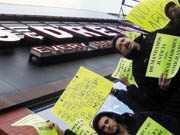Fernando Islas says that he worked for less than $4 an hour, was locked in a store overnight, forced to sleep on cardboard boxes and used newspapers for blankets at the 99-cent store where he worked.
Islas says that he asked his then-boss about his $235 a week salary and 70-hour weeks: “How come I’m getting paid so little?”
His boss’s alleged reply: “Oh, you’re just starting out. When you learn more, you’ll get paid more.”
Islas, 25, a Jersey City resident, told his story last week at a press conference announcing a suit filed in United States District Court against the owners of a chain of 99-cent stores in the New York metropolitan area. That conference was followed by a demonstration outside 99-Cent Dreams in Journal Square last week.
Islas is one of eight Jersey City plaintiffs in the suit against the company that owns the stores, Universal Distribution Center of North Bergen. Islas was the first to bring the alleged problems to light.
“They would make false promises to pick us up [to take us home after work], and they locked up the store and did not pick us up,” he said of the store’s management. Others spoke of having to eat the food on the shelves in the store.
Multiple calls to Universal Distribution went unreturned last week.
Another worker, Oscar Roldan, 30, said that management told him, “With Mexicans, you feed them bread and water all day, and they’ll work as long as you want.”
Now, these workers have enlisted the New Jersey chapter of the ACLU to fight to get back wages.
Failure to pay minimum wage and overtime is a violation of federal labor law.
“Sweatshops are thriving here in New Jersey,” said Jennifer Ching, an ACLU attorney representing the workers, “and they don’t have to be in dark hidden factories. They are on every street corner, and as our case demonstrates, even in the 99 cent stores that have become integrated into the fabric of countless neighborhoods.” Seven of the workers who filed the suit are of Mexican heritage, one Colombian. Some of the plaintiffs are undocumented aliens, a fact not lost on Ching.
“These workers are protected,” she said. They cannot be deported if involved in a labor case, she said.
When they worked at various locations in New York, Connecticut and New Jersey, the plaintiffs took part in preparing new stores for opening, moved boxes and merchandise in distribution centers, and stocked stores’ shelves, they said.
Many of the men said they chose to work at the stores because the employers did not check immigration papers. The workers initially filed a complaint in 1999 and had been trying to negotiate a settlement with the New Jersey Department of Labor, but those negotiations failed.
All of the plaintiffs are now working for other employers, according to Denis Johnston of the American Friends Service Committee in Newark, a group that the workers have asked for help in the negotiations with the Labor Department.
Johnston said that lack of enforcement and follow-through on the state level led to the filing of the civil suit.
After the press conference, the plaintiffs joined roughly 25 protesters outside the 99 cent store on Kennedy Blvd. They chanted, “shame on you,” “no justice, no peace,” “united workers will never be defeated,” and “sweatshops have got to go, hey-hey, ho-ho.” But store management, who said the conditions described by the workers were not true, called police down to break up the gathering. When they arrived, police told the protesters to make room on the sidewalk for pedestrians. They complied.
Inside the 99-cent Dream store in Journal Square, a worker folded up boxes. He said he makes $300 per week and works 10 hours per day. He says he does not get paid overtime.
